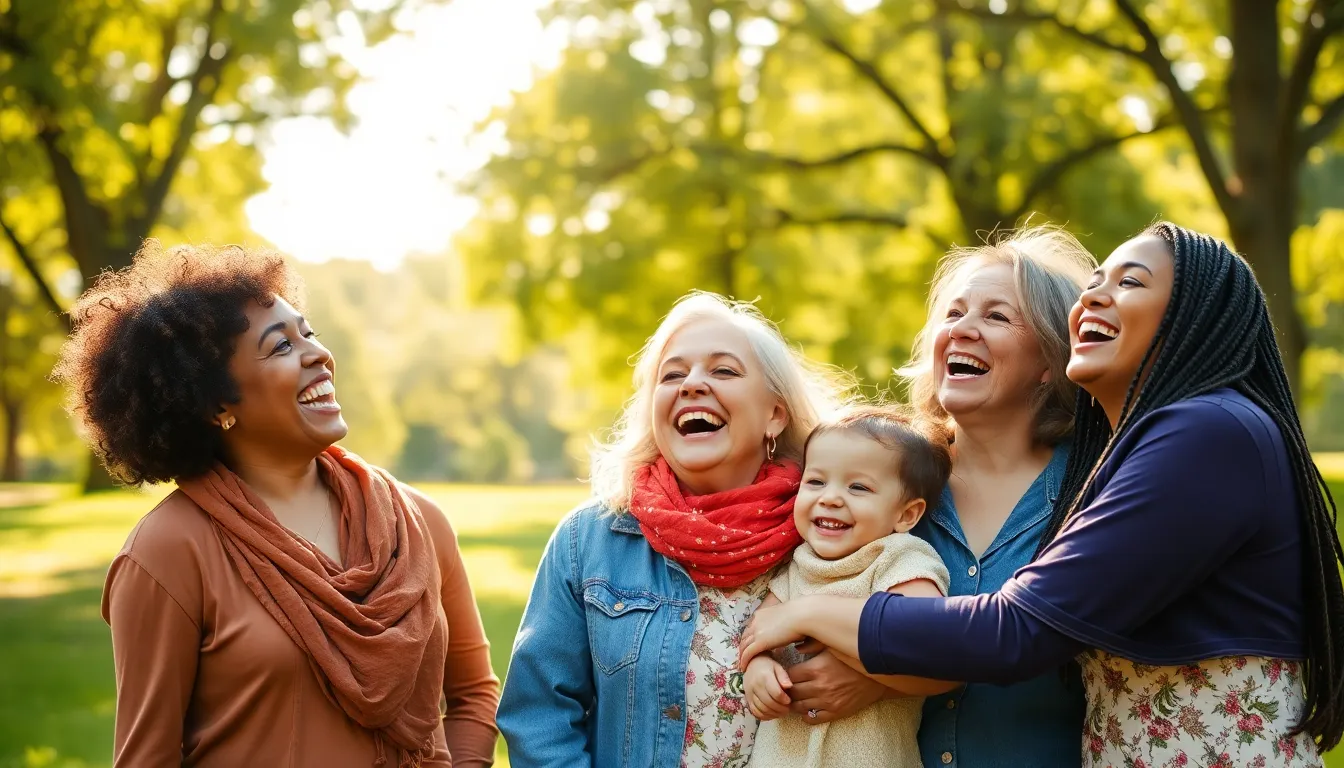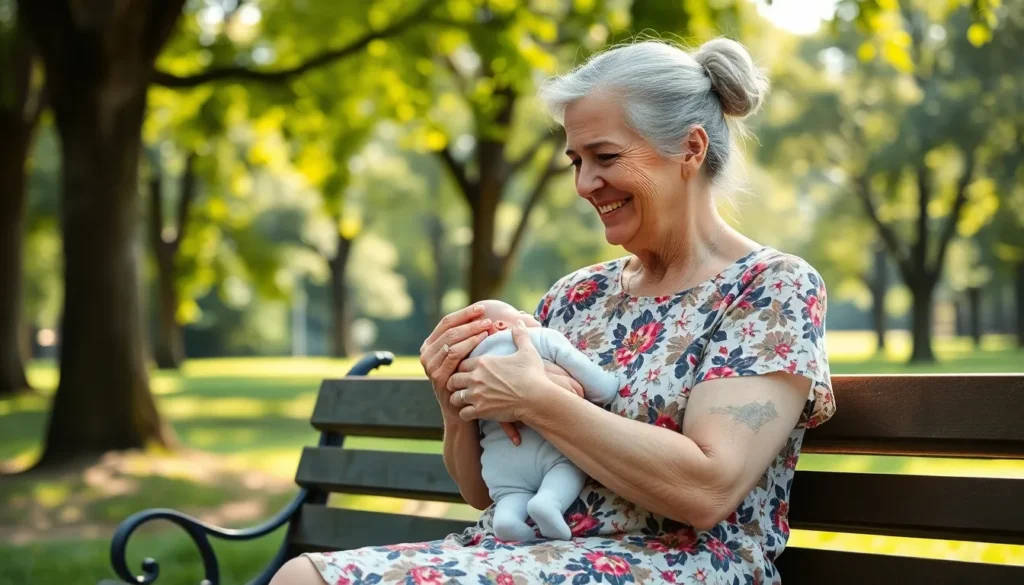In a world where age often defines life’s milestones, the stories of women who defy conventional timelines by becoming mothers later in life are both inspiring and thought-provoking. These remarkable women challenge societal norms and showcase the advancements in reproductive technology, health, and personal choice.
From groundbreaking medical procedures to the sheer determination of these mothers, their journeys highlight not just the joys of motherhood but also the complexities that come with it at an advanced age. As more women choose to embrace motherhood later, the conversation around fertility, health, and family dynamics continues to evolve, shedding light on what it truly means to start a family.
Table of Contents
ToggleOverview of Oldest Women to Have a Baby
Several remarkable cases illustrate the trend of women becoming mothers at advanced ages. Scientific advancements in reproductive technologies, like in vitro fertilization (IVF) and egg freezing, support these journeys.
- Maria del Carmen Bousada de Lara
Maria del Carmen, from Spain, holds the record for the oldest verified mother. She gave birth to twins at 66 years old in 2006, using IVF with donor eggs.
- Erramatti Mangayamma
Erramatti, an Indian woman, became a mother at 74 years old in 2019. She conceived twins through IVF, capturing global attention and conversations about age and motherhood.
- Adriana Iliescu
Adriana, from Romania, welcomed her daughter at 66 years old in 2005. She used IVF, becoming one of the earliest examples of later-life motherhood in Europe.
- Angela Bolton
Angela, from the UK, gave birth to her daughter at 62 years old in 2010. She utilized IVF with her own frozen embryos and demonstrated that motherhood remains possible well into one’s 60s.
- Vassiliki Vassilakopoulou
Vassiliki, a Greek woman, entered the record books by giving birth at 63 years old in 2011. Her story reinforces the increasing feasibility of becoming a mother later in life.
These examples signify a changing landscape in fertility, demonstrating that older women can embrace motherhood and challenge traditional timelines. Each story invites dialogue about societal expectations, health implications, and personal choices regarding motherhood at advanced ages.
Historical Context

Women becoming mothers later in life presents a significant shift in societal norms and reproductive practices. This section outlines key milestones in maternal age and cultural perspectives regarding age and motherhood.
Milestones in Maternal Age
Maternal age has evolved drastically over time. Historically, women often became mothers in their teens or early twenties. The late 20th century marked a turning point, as advancements in reproductive technology and changing social expectations allowed women to delay childbirth.
Notably, Maria del Carmen Bousada de Lara gave birth at 66 in 2006, becoming the oldest verified mother. Adriana Iliescu, who welcomed her daughter at 66 in 2005, challenged perceptions surrounding fertility. Erramatti Mangayamma, having a child at 74 in 2019, set a new record, exemplifying advancements in procedures like in vitro fertilization (IVF). Other notable cases include Angela Bolton at 62 and Vassiliki Vassilakopoulou at 63. These milestones illustrate a broader trend toward older motherhood.
Cultural Perspectives on Age and Motherhood
Cultural attitudes toward age and motherhood significantly influence women’s choices. In many Western societies, there’s often an emphasis on career advancement and personal development prior to childbearing. Conversely, some cultures prioritize early motherhood, viewing it as a fundamental aspect of womanhood.
Perceptions of older mothers can vary widely. In several Asian cultures, older motherhood is commonly accepted; women are often respected for their wisdom and experience. In contrast, certain Western societies may stigmatize older mothers, associating risks and health concerns with advanced maternal age. This contrast highlights the complexity of societal norms and individual choices, presenting diverse paths to motherhood.
Notable Cases
Several remarkable cases exemplify the trend of advanced-age motherhood, illustrating both the challenges and triumphs faced by older mothers.
Case Study: Maria del Carmen Bousada de Lara
Maria del Carmen Bousada de Lara became the oldest verified mother at the age of 66 in December 2006. Utilizing in vitro fertilization (IVF) with donor eggs, she successfully gave birth to twins. Bousada’s decision stirred global debate over the ethics of late parenthood, questioning the physical and emotional implications for both mother and child. Bousada passed away in 2009, but her story remains significant in the discussion of maternal age and technology’s role in reproductive choices.
Case Study: Brent Williams’ Story
Brent Williams, a 74-year-old man, made headlines in 2019 when he became a father through the use of a sperm donor. While his case primarily highlights fatherhood at an advanced age, it underscores the evolving conversation around parenthood in older individuals. His experience reveals the changing dynamics of family structures and the societal acceptance of older parenthood, contributing to the broader dialogue about age and responsible parenting.
Medical Considerations
Understanding the medical considerations surrounding advanced maternal age is crucial for prospective older mothers. These factors encompass both health risks and technological advancements that facilitate later pregnancies.
Risks and Challenges of Advanced Maternal Age
Advanced maternal age associates with numerous health risks. Increased chances of prenatal complications include gestational diabetes, preeclampsia, and high blood pressure. Older mothers face a higher likelihood of requiring cesarean sections due to complications during labor. Chromosomal abnormalities, such as Down syndrome, occur more frequently in babies born to older mothers, with the risk rising significantly after age 35.
Additionally, the physical toll of pregnancy might be more pronounced in older women, potentially leading to fatigue and recovery issues post-delivery. Medical professionals often recommend thorough preconception screenings and genetic counseling to address these risks adequately.
Assisted Reproductive Technologies
Assisted reproductive technologies (ART) play a pivotal role in enabling older women to conceive. Techniques such as in vitro fertilization (IVF) and egg freezing offer avenues for women to extend their reproductive years. IVF allows for the use of donor eggs, increasing the chances of successful pregnancies despite advanced maternal age.
Egg freezing provides women the option to preserve their fertility before age-related decline. Doctors frequently advise potential mothers to engage in these technologies early to maximize their effectiveness. Advances in ART continue to break barriers, reshaping the norms surrounding age and childbirth.
Societal Implications
The phenomenon of advanced-age motherhood significantly alters societal norms and challenges traditional family structures. As more women embrace motherhood later in life, conversations around parenting, health, and community expectations evolve.
Changes in Family Dynamics
Changes in family dynamics often occur as older mothers bring unique perspectives to parenting. Older parents generally possess greater life experience, which may translate to enhanced emotional stability and financial security. This maturity can foster deeper connections within families, creating environments that prioritize understanding and communication. Additionally, the presence of older siblings, like in cases of blended families, contributes to complex relationships where wisdom meets youthful energy. Such dynamics can enrich family life but may also prompt discussions about generational roles and responsibilities.
Aging Population and Parenthood
The aging population directly impacts societal views on parenthood. As life expectancy increases, trends show a growing acceptance of parenthood at older ages. This shift prompts policymakers to reconsider family support structures, such as childcare and healthcare services, tailored to older parents. Societal norms now reflect a broader acceptance of diverse family models, where age is less of a barrier to becoming a parent. This transformation raises questions about resource distribution and access to reproductive healthcare, emphasizing the need for inclusive policies that support all families regardless of parental age.
The journey of older mothers showcases a remarkable shift in societal perspectives on motherhood. As women embrace the opportunity to become parents later in life, they challenge traditional norms and redefine family dynamics. The advancements in reproductive technology play a crucial role in this transformation, providing options that were once unimaginable.
These inspiring stories not only highlight personal choices but also spark important conversations about health, parenting, and community support. As society continues to evolve, the acceptance of advanced-age motherhood will likely lead to more inclusive policies that cater to the diverse needs of families. The experiences of these women serve as a testament to resilience and the enduring desire for connection through motherhood at any age.





